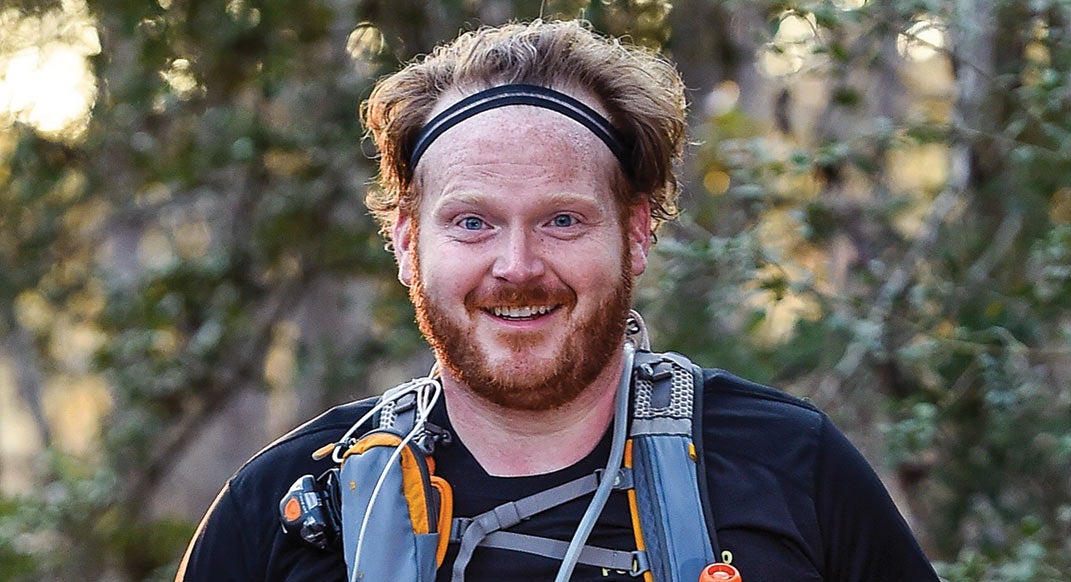Ultrarunning's First Stand-Up Comic

Eight minutes before the cutoff at this February’s Rocky Raccoon 100, a six-foot-two, 250-pound, freckled, bearded redhead named Jeffrey James Binney crossed the finish line.
Binney, a comedian whose slogan is “Hilarious. Captivating. Blindingly Pale,” grew up on a pig farm in Missouri, then studied musical theater in college and moved East. “Luckily my parents were super supportive of me splitting off to New York City to prance about on stage,” Binney, now 33, says. His roles were typically comedic: specifically, “the funny fat best friend.”
A few years later, he returned to Missouri as his mother’s health deteriorated. He was with her for the final year and a half. Close to the end, prompted by an outdoor magazine he found in the hospital waiting room, he went for a trail run. He weighed 340 pounds and was not at all athletic, but something clicked.
“The idea that no matter what I was doing, I could disappear into the woods for however long I wanted—there’s nothing I needed more at that point in my life than that,” he says.
He began running regularly, dropped some of the weight and worked his way up to longer distances: a 20-miler, a couple of marathons, a 50-miler. He signed on with ultrarunning coach Ian Sharman and, in August 2015, attempted his first 100-miler: the challenging Leadville Trail 100, in Colorado. Over the cutoff, he was pulled before halfway; Rocky Raccoon, six months later, was his first 100-mile finish. (As it happens, Sharman won both races.)
Despite the DNF, Binney is turning his Leadville experience into a film, aptly titled Once Is Enough. He characterizes it as “sort of like a nonfiction version of Louie C.K.’s show or Inside Amy Schumer”—half documentary about his “fiasco” of a Leadville race, half live-comedy show.
It’ll be Binney’s first hour-long comedy special, and, as far as we’re aware, the first stand-up routine about ultrarunning. With chafing, GI issues, hallucinations and max-cushion clown shoes as material, someone was bound to do it.
I’ve always wondered about very niche roles. Once you are getting cast as the funny fat friend, is there pressure to stay overweight?
Yeah, definitely. I lost the first 40 or 50 pounds pretty quickly. I went into my agent’s office—he hadn’t seen me—and as I left, he said, “Hey, you look good, but, uh, let’s not lose any more weight, OK?”
It’s part of the business. For a six-foot-two, 250-pound, jovial ginger to walk into a room—people immediately pin me as the funny fat best friend. They’re not as apt to imagine, “Oh, man, I bet he’d be really great as a villain.”
What kind of impact did your mother’s death have on you?
Well, huge. She was only 58. The doctors made no bones about the fact that it was obesity related. If she could lose weight, it was possibly reversible, or at the very least could buy her years of life. And she just couldn’t do it.
So I saw a great example of what I did not want to be at 58. And there’s no better motivation than death, is there?
That’s when you started running?
It was while she was in the hospital. I was in the ICU waiting room, and there were some outdoor magazines—it might have even been Trail Runner.
I’ve always been into backpacking, I’ve been into cycling—but I was like, oh, man, this kind of looks cool. And then there was one really, really, particularly bad hospital day. I went out, bought a pair of Merrell trail-running shoes, found a trail and went for a run.
At that point, I was like 340 pounds. I don’t know if you can call it a run. It might have been more of a waddle. But I was hooked.
Did you ever consider road running?
Not really. I feel like nature makes the running bearable.
Where did the idea to make a film about running Leadville come from?
I had a hard time reconciling my want to do something creatively fulfilling with my desire to disappear into the woods every day and never come back. So I thought, what better to inspire my first hour comedy special than to do something absolutely absurd, like try to run a 100-mile ultramarathon?
So how’d it go?
I’m never fast. My goal right now is always just to finish. It’s scary running down the trail with the cutoff monster at your heels when you really, really need a porta-potty. I got to mile 44 or something like that, and I was 13 or 14 minutes after the cutoff, and unfortunately got pulled.
I still felt, not like a million bucks, maybe like 800,000 bucks. So I was able to take a little comfort in the fact that I didn’t choose to quit.
Your stand-up show, is it about running or about Leadville?
It’s sort of all-encompassing. I talk a lot about my childhood and my mom and how I ended up chubby, and how I ended up not a runner, and then it covers why I started running, and Leadville and Rocky Raccoon.
How have you found the social aspect of trail running?
I actually talk a bit about that in my show. Everybody who comes by, it’s “great job,” “good job, runner,” “you got this.” And you know? I don’t know if I do got this. I’m on mile 87 and I can barely breathe and I really want to thank you for your kind words, but I can’t.
So yeah, it’s amazing. There’s a sense of community that I’ve never experienced in any other silly little hobby.
Paul Cuno-Booth is Trail Runner‘s associate editor. This article originally appeared in our October 2016 issue.